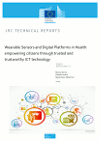 The JRC project on Trust in Digital Interactions (TRUDI) deals with the construction and renewal of confident and trusted relationships among institutions, corporations and citizens, addressed as a major and urgent issue to be solved. The present report examines relationships for nurturing trust between corporations and citizens. In this context the JRC investigated wearable sensors and digital platforms in health as an empirical case study of citizens' involvement in designing the values embedded in information systems and services as well as their implementation and management.
The JRC project on Trust in Digital Interactions (TRUDI) deals with the construction and renewal of confident and trusted relationships among institutions, corporations and citizens, addressed as a major and urgent issue to be solved. The present report examines relationships for nurturing trust between corporations and citizens. In this context the JRC investigated wearable sensors and digital platforms in health as an empirical case study of citizens' involvement in designing the values embedded in information systems and services as well as their implementation and management.
Personal wearable sensors could become the most powerful individual self-surveillance technology available to citizens. These ubiquitous, networked devices currently offer a breadth of capabilities to sense, digitally enhance and upload data of fine granularity such as body and health physiological functions, images, locations, sounds and motion. However, for wider adoption, it is crucial for citizens/end-users to rely on trusted and trustworthy implementations of wearable sensing technologies. Trusted systems are defined as systems functioning normally and delivering what it is promised and what the user expects, whereas trustworthiness is mostly objectively defined according to specific criteria and can be considered a metric for how much a system deserve the trust of its users (Kounelis et al. 2014). Therefore, in order to establish criteria for trust and trustworthiness, the present report aims to screen and analyse emerging solutions and architectures for verifying how these systems actually work; particularly, for checking whether functionalities, motivations and values embedded in their design hold the potential for user empowerment, equitable use and meaningful community participation in digital health platforms.
Download: Wearable Sensors and Digital Platforms in Health (.pdf, 11.223 KB).
Download from eHealthNews.eu: Wearable Sensors and Digital Platforms in Health (.pdf, 11.223 KB).